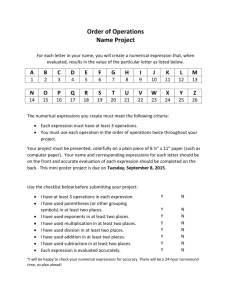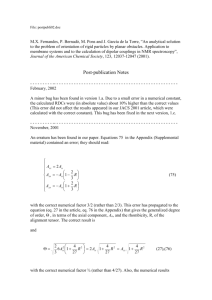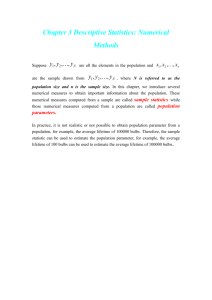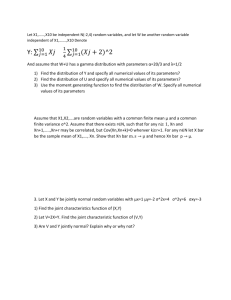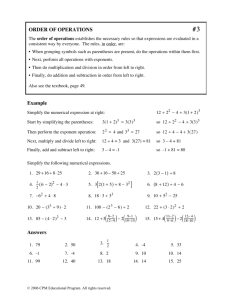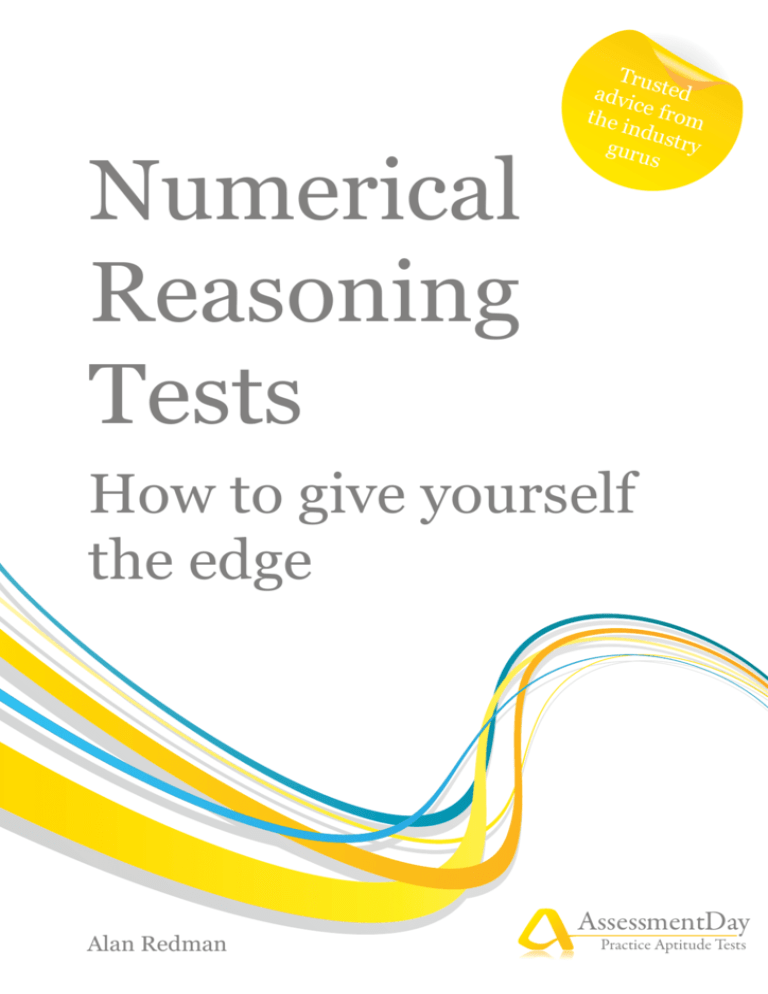
Numerical
Reasoning
Tests
Tru
advi sted
c
the e from
indu
guru stry
s
How to give yourself
the edge
Alan Redman
AssessmentDay
Practice Aptitude Tests
Numerical Reasoning Tests
How to give yourself the edge
Published November 2010
AssessmentDay Ltd
All rights reserved. No part of this publication
may be reproduced or transmitted in any form or
by any means, electronic or mechanical,
including photocopy, recording or any
information storage and retrieval system, without
prior permission in writing from the publisher.
Web: http://www.assessmentday.co.uk
Email: info@assessmentday.co.uk
Copyright © AssessmentDay Ltd 2010
Author Alan Redman
Numerical Reasoning Tests: How to Give Yourself the Edge
How this guide works
This guide will help you develop the skills, knowledge and strategies
you need to demonstrate your strengths when taking numerical tests.
It’s a competitive job market out there and employers are increasingly
turning to numerical tests to help them make choices about who to
invite to interview. To maximise your chances of success in the hunt
for a job you need to give yourself an edge by ensuring that your
numerical test performance does not let you down. You should use this
guide alongside the practice test questions on the AssessmentDay
website to take your numerical test performance to its highest level.
This guide has been written by a charted occupational psychologist
who is a director of a leading psychometric test publisher. By taking
on- board the advice contained within this guide you will be getting
expert coaching from a leading voice of the psychometric testing
industry.
www.AssessmentDay.co.uk
1
Numerical Reasoning Tests: How to Give Yourself the Edge
Contents
Section 1: Know what you’re up against ..... 4 How a numerical test works .....................................................................5 What maths do I need to know? .............................................................. 6 What is high-level critical reasoning? ...................................................... 7 The top-five professional level numerical tests used by employers........ 8 Section 2: Become a test-taking black-belt 11 How strategies make the difference to your score ................................. 11 Preparing for your test ............................................................................ 12 Focus, nerves and concentration ............................................................ 13 Effective test session behaviours ............................................................ 14 Online testing vs. paper and pencil tests ................................................ 19 Why not cheat? ....................................................................................... 19 Section 3: Developing your numerical
ability ....................................................... 22 Key numerical abilities to develop......................................................... 22 Moving your score upwards................................................................... 23 Where else to practice ............................................................................ 24 Section 4: Your rights as a test-taker ........ 26 What the employer should tell you up front about the test .................. 26 Should your test be adjusted? .................................................................27 What to do if the test session goes badly? ..............................................27 What happens to your test score ........................................................... 28 What to do about test score feedback .................................................... 28 A final word ............................................................................................ 29 www.AssessmentDay.co.uk
2
Section 1:
Know what you’re
up against
Numerical Reasoning Tests: How to Give Yourself the Edge
Section 1: Know what you’re up against
The guide begins by orientating you in the current world of numerical
testing. This section explains how the tests work, what numerical
abilities they measure and a preview of the most widely used
professional level tests used by employers today. This section includes:
1.
2.
3.
4.
How a numerical test works
What maths do I need to know?
What is high-level critical reasoning?
The top-five professional level numerical tests used by employers
Anyone who tells us “you have nothing to fear but fear itself” probably
doesn’t expect to be asked to complete a numerical test anytime soon.
When you are required to sit a numerical test there can be plenty to
fear; the prospect of not performing well enough and missing out on a
great job opportunity. Then there is the fear of the test itself.
N
umerical tests are the number one source of anxiety for most
test takers. People seem to fear a numerical test much more
than a verbal test, which is the other most commonly used test
by employers. The fear can come from many places: previous poor
numerical test results, stressful maths exams at school or college or
fear of the unknown. Whatever its source, fear itself is a major obstacle
to performing well in test.
Fear leads to anxiety; anxiety leads to stress and stress leads to the
dark-side: under-performance and failure. So the first step in
maximising your numerical test score is to deal with the fear; learn to
laugh in its face. The best way to defuse the fear, anxiety and stress of
taking a numerical test is through understanding. Once you know how
they work, what skills you need and what the tests look like you can
move away from fear and into confidence.
This section explains how the tests work, what numerical abilities they
measure and give you a preview of the most widely used professional
level tests used by employers today. With this knowledge in place you
can put the fear to one side and focus on maximising your numerical
test performance.
www.AssessmentDay.co.uk
4
Numerical Reasoning Tests: How to Give Yourself the Edge
How a numerical test works
The great thing about numerical tests is that they are not the same as a
maths test. Of course, they involve numbers and calculations but they
are not trying to measure your maths ability in the same way as a
school exam. This is great news for those of us with dark memories of
impenetrable maths questions requiring skills like algebra,
trigonometry and probabilities. Numerical tests do not require you to
write out longhand answers; they do not require knowledge of
formulae and theories; they do not require you to revise beforehand.
Numerical tests are fundamentally different from maths tests because
of what they are built to measure. Rather than assess your
understanding and application of a maths syllabus (such as GCSE or
A-Level) they are designed to measure your ability to correctly
interpret numerical information and use it to solve problems and
make decisions. Modern tests base the information on real-life
numerical data you would find in the workplace. So numerical tests
only really require you to perform the kinds of analysis with numbers
you’d be expected to perform at work.
This difference between maths exams and numerical tests means that
sometimes people’s scores from both are different. Employers often
see candidates with great maths qualifications who demonstrate poor
numerical test results. This is generally the result of the maths
qualifications being pushed up by good exam technique, lots of
revision and effective memory ability. The numerical test score is
lower because it is not affected by exam technique, revision and
memory; the numerical test relies on effective analysis, problemsolving and good test-taking technique, of which you will learn more in
section 2 of this guide.
This is great news for those test-takers who have traditionally
struggled with maths exams. Numerical tests are different - they
measure different skills in a different way. Employers often see
candidates with low or mediocre maths qualifications who can
perform very well on the much more job-relevant numerical test.
www.AssessmentDay.co.uk
5
Numerical Reasoning Tests: How to Give Yourself the Edge
As well a being different from maths exams, numerical tests tend to
share a number of common characteristics, so you will always know
what to expect. Common characteristics of numerical tests include:
• Multiple choice answers - no longhand answers or showing
your working-out
• Use of calculators permitted - no mental arithmetic required
• Strict time limits - some are generous while some are very short
(we cover this in section 2)
• Example questions before you start the test - these are not
timed or scored
• No prior knowledge required - no equations to memorise (or
surreptitiously write on your arm)
• Relevant to the workplace - modern tests are based on the kind
of numerical information you would deal with in the job
Understanding how numerical tests work, how they are different from
maths exams and their common characteristics should begin to dispel
the fear of the unknown. Any remaining anxiety about your
performance can be countered by developing a deeper understanding
of the inner-workings of tests and, in section 2 of this guide, the most
effective test taking techniques to develop based on this
understanding.
What maths do I need to know?
Numerical tests are not the same as maths exams but you will still
need some maths skills - you will be dealing with problems based on
numbers after all. Fortunately for those of us with a less than warm
relationship with maths the skills you need are far simpler than those
expected by maths GCSE.
Here’s a list of the most widely used maths calculations in numerical
tests:
1.
2.
3.
4.
Addition
Subtraction
Multiplication
Division
www.AssessmentDay.co.uk
6
Numerical Reasoning Tests: How to Give Yourself the Edge
5. Averages
6. Percentages
7. Ratios
If you are unfamiliar or unconfident with any of these maths skills you
should focus your time on test practice questions that require the
forms of calculation that trouble you. You could also look to use basic
maths study aids to supplement your development through the
practice questions.
Remember that you will be allowed to use a calculator during the
numerical test to complete these calculations.
What is high-level critical reasoning?
Graduate and professional tests are at the top of the numerical-test
tree as far as difficulty is concerned. These top-level tests measure the
advanced skill of numerical critical-reasoning to reflect the demands
of the jobs for which they are used to help recruit and the calibre of
candidates who apply
The difficulty of these tests does not lie in the types of calculations you
are required to perform; numerical critical-reasoning tests are still
based around the seven basic maths skills described above. Their
difficulty is the result of the complexity of the numerical data the
questions are based upon and the nature of the problems you are
required to solve.
Numerical critical reasoning is the ability to analyse and manipulate
numerical information in order to draw inferences, determine
underlying relationships and make decisions. These high-level tests
are different from those you might be expected to complete for entrylevel or mid-level roles because you are expected to demonstrated
abilities that are above and beyond simply understanding numerical
data and answering questions about it. Instead you will need to work
in a more complex way to arrive at correct answers.
What this means in reality is that to answer a numerical criticalreasoning test you are often required to perform multiple calculations.
In other words there may be several stages of calculation you need to
www.AssessmentDay.co.uk
7
Numerical Reasoning Tests: How to Give Yourself the Edge
complete to reach an answer. Sometimes this even involves a degree of
estimation or dealing with ambiguities, as you sometimes would at
work.
If this sounds a little daunting don’t worry. The calculations are still
based on basic maths skills. You can maximise your score by
developing effective test-taking technique (as described in section 2).
You can complete some practice questions to get a preview of the
demands presented by critical reasoning questions; they may not be as
bad as you think!
The top-five professional level numerical
tests used by employers
A good test-taking technique is to always ask an employer which test
they use – it is best practice for test users to provide this kind of
information so don’t take no for an answer! Once you know which test
the employer uses you can find out more about the assessment by
looking at the test publisher’s website; this may also provide additional
practice questions.
If you are asked to complete a high-level numerical test in the UK it is
likely to be one of the top-five used by employers. These are briefly
described below along with some advice on where you can find out
more.
1. SHL Verify Ability Tests
SHL are the most widely used test publisher by employers in the UK so
you are likely to come up against their assessments when going for a
job. SHL’s professional level numerical test is drawn from their Verify
series. The numerical test has a time limit between 17-25 minutes and
you will need to work quickly to get through all the questions. You can
find out more about the test on SHL’s website (SHL.com).
2. Utopia numerical critical-reasoning test
This test is published by Criterion Partnership and contains numerical
information relating to an environmental theme, but you don’t need
prior knowledge of green issues to perform well in the test. The
www.AssessmentDay.co.uk
8
Numerical Reasoning Tests: How to Give Yourself the Edge
numerical test consists of 30 questions and you have a generous 45
minutes time-limit; most people attempt all of the test questions
within the time limit, but beware because the questions get
progressively harder. More information about the test and practice
questions can be found at the Criterion Partnership website
(criterionpartnership.co.uk). Criterion have also published a book for
test for people taking a numerical test, which is available through
Amazon: “Practise and Pass - Professional: Numeracy Tests” by Alan
Redman.
3. Graduate-Management Assessment (GMA)
This is a very old numerical test published by Previsor; its age means
that a lot of employers still use it, especially in the public sector and
civil service. The test has 33 questions and a time limit of 30 minutes,
which means that most candidates do not get time to attempt all the
questions. You can find out more at previsor.co.uk.
4. Infinity Series Managerial and Graduate Ability Tests
This online test series is relatively new and so is not used in such a
widespread way as those in the top 3, but its use may spread with time.
The test varies the number of questions each candidate takes by taking
your answers to the previous questions into account. The numerical
test has around 20 questions and the time limit is 22 minutes (though
this varies with the number of questions the test decides to give you).
You can learn more at kenexa.com.
5. Bespoke numerical tests
Many larger employers, who deal with thousands of assessments each
year, will use a bespoke numerical test that has been developed
specifically for them. Bespoke tests have the advantage of containing
subject matter that is specific to the role, which gives candidates a
helpful insight into the types of numerical demands they might face in
the job. Bespoke tests also contain questions that won’t be found in
off-the-shelf tests. The employer should still provide you with
information about the test. For practice questions you should use the
AssessmentDay.co.uk website.
www.AssessmentDay.co.uk
9
Section 2:
Become a testtaking black belt
Numerical Reasoning Tests: How to Give Yourself the Edge
Section 2: Become a test-taking black-belt
When you’re taking a numerical test, it’s not all about maximum
effort; it’s about the right kind of effort in the right places. This section
introduces you to the advanced test taking strategies you will develop
to ensure that your test score is not dragged down by errors, slips and
poor technique. Test-taking black-belts achieve their high scores by
applying the numerical abilities they have developed through practice
using the sharpest strategies. This section includes:
1.
2.
3.
4.
5.
6.
7.
How strategies make the difference to your score
Preparing for your test
Timing and pacing - when to race and when to pause
Focus, nerves and concentration
Avoiding stupid mistakes
Why not cheat?
Online testing vs. paper and pencil tests
T
he conventional approach to increasing your score on a
numerical test involves completing lots of practice questions.
This can certainly help you to develop your numerical ability
and increase your familiarity with test questions and confidence when
taking a real test.
But if you really want to grow your test score to its maximum you need
to ensure that your practicing is partnered by a focus on the
development of your test-taking strategies. The only way to lift your
test performance to its highest level is to make sure that your
numerical ability is not let down by poor test-taking habits.
How strategies make the difference to
your score
Two candidates can have equal levels of numerical ability, but one
candidate can score significantly higher on a numerical test than the
other. Why is this? Differences we see in people’s test scores are often
down to factors unrelated to their numerical ability, such as:
www.AssessmentDay.co.uk
11
Numerical Reasoning Tests: How to Give Yourself the Edge
•
•
•
•
Lack of familiarity with test taking
Poor timing
Stupid mistakes
Nerves and anxiety
Candidates with high scores tend to posses high levels of numerical
ability combined with effective test-taking strategies. These test-taking
black belts know that when you’re taking a numerical test, it’s not all
about maximum effort; it’s about the right kind of effort in the right
places.
This section introduces you to the advanced test-taking strategies you
will develop to ensure that your test score is not dragged down by
errors, slips and poor technique. Test-taking black-belts achieve their
high scores by applying the numerical abilities they have developed
through practice using the sharpest strategies. This section describes
the winning strategies that can make a real difference to your
numerical test performance.
Preparing for your test
Completing practice questions is an important part of effective
preparation for taking a numerical test. But to really give yourself an
edge there are a number of key preparation steps you should follow
before you complete a numerical test:
Find out more about the test
Ask the employer which numerical test you will be required to
complete; you can also ask them if they can provide you with any
practice or advice materials relating to the test they use. Take a look at
the test publisher’s website for any information relating to the test.
Some employer’s careers websites also contain help, advice and
frequently asked questions for candidates.
Get an early night
During the test you will need to draw on a focused burst of
concentration. Numerical critical-reasoning tests place high demands
www.AssessmentDay.co.uk
12
Numerical Reasoning Tests: How to Give Yourself the Edge
on your mental processing power and cognitive abilities. You will only
be able to perform at your peak if you are well rested and physically
prepared for the trials of the test. Don’t stay up late before a testtaking session and avoid food or drink that may leave you feeling
sluggish or fatigued. Your numerical ability can only be exploited fully
if your body is ready for the challenge.
Arrive in plenty of time
If you arrive at the test session flustered from running late your mind
will not be in a good place for focusing your efforts on the test. The
stress of arriving late is very likely to impact negatively on your test
performance. Give yourself the edge by making sure you know where
the test session is (getting lost and arriving late is a double whammy in
stress terms) and make sure you arrive in good time to focus and calm
yourself before the test session begins.
Focus, nerves and concentration
For many of us the worse part of taking a numerical test is the waiting
beforehand. The nerves and anxiety we can experience before the test
session can spill into the early stages of the test itself, affecting your
focus and concentration. You need to maintain maximum
concentration during the test session in order to perform at your best.
Nerves and anxiety must be minimised before they cause mistakes and
a dip in performance. Here are some tips for combating nerves and
building focus prior to the test session:
And breathe…
If you’re feeling nervous then move your attention to your breathing.
Ensure you are taking long, slow breaths and focus your mind on
counting slowly down from 10 with each breath. Each time your mind
wanders from breathing this countdown you should gently move the
distracting thought to one side and begin the count again from 10. This
focusing exercise reduces your stress levels and enables the parts of
your mind devoted to concentration and reasoning to marshal its
energies ready for the test itself.
www.AssessmentDay.co.uk
13
Numerical Reasoning Tests: How to Give Yourself the Edge
Feel the fear and do it anyway
Sometimes our nerves and anxiety can cause distracting physical and
mental symptoms of stress. A racing heart, sweaty palms and a mind
full of chattering monkeys are common stress-related sensations,
which make concentration and peak performance much harder to
achieve. Rather than try to fight against these feelings you should use
the ‘acceptance and commitment technique’ to move past them. Quiet
your mind by moving around your body to notice, label and accept
each of the stress related sensation you identify. Do not try to
counteract them; simply acknowledge that they are there. Next you
must work on your commitment; remind yourself of your objectives
and then rehearse exactly what you are going to do when the test
session begins. Acceptance and commitment technique helps you to
feel the fear and do it anyway.
Ensuring that you are focused and calm will help you to employ the
effective test-taking strategies during the test session itself that will
give you the edge.
Effective test session behaviours
The biggest difference between the test-taking black-belt and the less
experienced candidate is the test taking strategies employed during the
test session itself. Taken individually these strategies appear
disarmingly simple, but combined they create a powerful force for
maximising your numerical test score.
Listen very carefully
The test administrator may say things only once so you need to attend
fully to the instructions you are given. Typically the person delivering
the test will read the instructions aloud while you read along at the
same time from your test booklet. Do not allow yourself to read ahead
or you are likely to miss a critical detail that the test administrator
emphasises as they read it out. You will have opportunities to ask
questions during this part of the test session – make sure you ask them
if you have even the slightest worry or lack of clarity about the test and
its instructions. It’s better to ask an easily answered question than
reduce your test score by making a stupid mistake based on a
misunderstanding of the test instructions. You will not have the
www.AssessmentDay.co.uk
14
Numerical Reasoning Tests: How to Give Yourself the Edge
opportunity to ask questions once the test has begun, so during the
instructions it is critical that you listen with care and ask questions
when necessary.
Getting the most from example questions
Before taking the test itself you will generally get the chance to
complete some example questions. These form part of the instructions
stage of the test session and are designed to ensure that you
understand the format for attempting the test questions and giving
your answers. The example questions are not timed, they do not
contribute to your final test score and you are told what the correct
answers are before you begin the test itself. You are also allowed to ask
questions about these examples. Black belt test-takers use the example
questions section of the test session effectively by making sure they
take the opportunity to ask any questions that they have about the test
and its format. They are also careful not to panic if they are asked to
have another go at any of the example questions.
Don’t worry about other people
The only person you are really competing with during a test session is
yourself. The only test performance that matters is your own. Do not
worry about how quickly or slowly other people are completing the
test. Don’t worry what other people might think of any questions you
ask during the instructions part of the test session. Focus on your own
performance not that of others.
Don’t get stuck
If you have trouble with a test question you should avoid spending too
long over trying to work it out. Getting one question wrong will have
less impact on your overall performance than devoting too much time
to it and answering fewer questions correctly overall. If you get stuck it
is better to move on to the remaining questions in the test. You can
return to the question you skipped if you have any time left at the end
of the test.
Don’t guess
There may be questions in the numerical test that you simply can’t
answer. You should always give an answer (you might get it correct by
www.AssessmentDay.co.uk
15
Numerical Reasoning Tests: How to Give Yourself the Edge
chance) but you should never simply guess – you should use the
multiple-choice format of numerical tests to your advantage. Most
numerical tests give you a choice of 5 answers for each question to
choose from. In an ideal world you calculate your answer and find it
matches one of the multiple-choice options. But if you can’t work it out
then you need to take an educated guess, which is different from
simply guessing.
If you simply guess you have a one-in-five chance of getting the right
answer (that’s a 20% chance of scoring a mark or an 80% probability
of getting it wrong!). What you need to do is boost your chances by
eliminating any of the multiple-choice answers that you can see are
obviously wrong. Test developers design the incorrect multiple-choice
options to be distracting in order to camouflage the identity of the
correct answer. These incorrect answers are called ‘distracters’ for this
reason. Some distracters are fairly obviously wrong while others are
closer to the right answer.
For most numerical questions there will be two or three distracters
that are more obviously wrong; try to identify these first so you can
focus on the remaining couple of answers. One of these is the correct
one. You have increased your changes from one-in-five to one-in-two
of picking the right answer. You should pick the answer from the two
(or sometimes three) that are not obviously wrong on the basis of
which one looks most likely. You can use some estimation or a sense
from the numerical information on which the question is based of
which answer looks correct.
It may still ultimately be a guess but it is an educated guess. And
sometimes at work as in tests that’s what we are required to take,
which makes it a valuable element of your numerical ability.
Timing and pacing - when to race and when to pause
The general advice for pacing yourself when completing tests is to
work quickly and accurately and not to dwell too long on any single
question. Test-taking black belts deploy a more sophisticated range of
strategies in terms of timing and pacing.
With a high-level numerical critical-reasoning test the rule of thumb is
1 minute per question. Some questions will not take as long as this
while others will; but on average this 1 minute per question is broadly
www.AssessmentDay.co.uk
16
Numerical Reasoning Tests: How to Give Yourself the Edge
appropriate for most numerical tests. A word of warning though; don’t
distract yourself by focusing on timing yourself at the expense of
concentrating on your answers.
A more sophisticated strategy is to vary your pace rather than time
your answers. This requires you to identify what type of numerical test
you are completing. There are two types:
• Speed tests – these tests have more questions than you could
possibly answer in the time available. If the total number of
questions is greater than the time limit then the test breaks the 1
minute per question rule. This makes it a speed test – it is designed
to put you under time pressure and candidates are not generally
expected to have time to attempt all the questions within the time
limit.
• Power tests – these tests have a generous time limit, more than 1
minute per question. This means that candidates are generally
expected to attempt all the questions in the test within the time
allowed. Sometimes power tests do not have a time limit at all.
To pace yourself effectively you should vary your approach depending
on whether you are completing a speed test or a power test.
• Completing a speed test – you do need to work quickly and not
spend an undue amount of time on any single question. The
questions themselves will not vary too much in terms of difficulty.
You should not rush the test by trying to complete all the questions.
It is better to work steadily through the majority of questions (half
to two-thirds) and get lots of correct answers than answer all the
questions but make lots of mistakes.
• Completing a power test – you do not need to race but need to
maintain a steady pace. You will have time to attempt all the
questions if you stick to the general 1 minute per question rule but
watch-out; the questions will get progressively more difficult as you
complete the test. You will find yourself gradually slowing down as
you get nearer the end of the test as the complexity of the questions
increase.
www.AssessmentDay.co.uk
17
Numerical Reasoning Tests: How to Give Yourself the Edge
Avoiding stupid mistakes
To really give yourself an edge when taking a numerical test you must
be on guard for the type of stupid mistakes that drag down your total
test score and leave your real numerical ability being grossly
misrepresented. Often these mistakes are caused by nerves or a lack of
test-taking experience. As a test-taking black belt you should watch out
for these common stupid mistakes.
• Being a sucker – all of the incorrect multiple-choice options are
designed to be distracting, but some are more distracting than
others. The test publisher will include distracters that are common
wrong answers – they are almost there to tempt you into making a
wrong choice. Avoid being suckered into picking these wrong
answers by making sure that your calculations fully answer the
question; check you haven’t missed out a vital last step in your
working-out.
• Losing your way – a fair number of candidates lose their place on
the answer sheet (or even on-screen for computer based tests) and
put their answers against the wrong question. This sometimes
means that many of the questions end up being scored as incorrect
if the candidate does not notice the mistake; if they do notice a
significant amount of valuable test-taking time can be wasted
correcting the error. Always make sure that the place where you are
giving your answer corresponds with the number of the question
you are answering.
• Sausage fingers – slips on the calculator cause errors, delays and
incorrect answers. These sorts of errors are avoidable if you take
care with the calculator and don’t miss-key the buttons.
Check your answers
Even test-taking black belts can make mistakes. If you have some time
left over at the end of the test (before the time limit is up) you should
use it to good effect. Using extra time to check your answers is a
powerful test taking strategy, especially with numerical tests where a
simple error leads to a wrong answer. You can start with questions you
find difficult or perhaps weren’t able to answer earlier in the test
session (sometimes the tight lid on a jar becomes looser if you leave it
and try again later). But you should also take time to check your
www.AssessmentDay.co.uk
18
Numerical Reasoning Tests: How to Give Yourself the Edge
answers to the questions you found easy – sometimes the easy answer
is the wrong answer.
Online testing vs. paper and pencil tests
Many employers now use online tests rather than traditional paper &
pencil tests, especially for professional level testing. Most of the test
taking strategies that apply to paper & pencil tests can be transferred
directly to taking an online test. However, there are a few test-taking
strategies that are specific to online tests.
• Find a quiet test-taking environment – online tests tend to be
completed remotely and are unsupervised. That means you will be
taking it at a location of your own choosing. This could be your
home or office or a library or internet-café if you have no access to
the web. Wherever the location you must ensure that the immediate
testing environment is as quiet and distraction-free as possible.
Make sure you won’t be disturbed by phone calls or other people.
Pick a time of day when you feel at your best.
• Use an up-to-date internet browser – make sure that the
computer you are using has the most recent version of your browser
installed. Generally speaking online tests prefer a minimum of
Internet Explorer 7 to run properly. If you use a different browser
(such as Firefox or Chrome) make sure it is the most recent version.
You should also remove any custom security settings you might
have specified and switch off any other software that may interfere
with the test, such as pop-up blockers and internet security suites.
Accelerator software (designed to speed-up slower internet
connections) can also cause problems to the way online tests
behave.
Why not cheat?
It may seem like a tempting test-taking strategy, especially if you’re
asked to complete an unsupervised online test. However you should be
aware that most online tests contain a number of measures to
minimise and detect your efforts to cheat:
www.AssessmentDay.co.uk
19
Numerical Reasoning Tests: How to Give Yourself the Edge
• Randomisation – online tests will typically present a random
selection of questions to each candidate. So trying to take the test
more than once or finding the ‘correct’ answers from someone who
has taken the test before are likely to be ineffective.
• Verification of results – if an employer asks you to complete an
online test remotely and unsupervised then they will check the
results at a later stage of the recruitment process. This typically
means some form of re-testing to make sure that your online test
results are an accurate reflection of your numerical test ability. So
it’s no good getting help during your online test; your genuine
numerical ability will be assessed later on.
www.AssessmentDay.co.uk
20
Section 3:
Developing your
numerical ability
Numerical Reasoning Tests: How to Give Yourself the Edge
Section 3: Developing your numerical ability
Completing practice questions will help improve your score but you
also need to develop a strategy. While practice is an essential part of
developing your numerical test performance you need to make sure
that you are developing your ability to its full potential. This section
will help you get the most from practice questions by ensuring that the
work you put in is translated into real learning that enhances your test
scores. This section includes:
1. Key numerical abilities to develop
2. Moving your score upwards
3. Where else to practice
T
o give yourself the edge in numerical test performance you can
develop your test-taking strategies to black belt level and you
can complete practice questions. While both approaches are an
essential part of developing your numerical test performance you need
to make sure that you are developing your underlying numerical
ability to its full potential. This section will help you get the most from
your development through practice and test strategies by ensuring that
the work you put in is translating in real improvements in the
numerical abilities that enhance your test scores.
Key numerical abilities to develop
Section 1 of this guide described the range of maths techniques that
numerical ability tests draw upon. In order to develop your actual
numerical ability you need to become confident in applying these
forms of calculation. Developing these maths techniques will
strengthen your numerical ability and therefore increase your test
scores.
To maximise your performance on high level numerical tests you also
need to develop confidence a range of other numerical skills:
• Interpreting graphs and charts
www.AssessmentDay.co.uk
22
Numerical Reasoning Tests: How to Give Yourself the Edge
• Interpreting pie charts
• Working with financial data such as costs and sales figures
• Estimation
If you are completing practice questions you should find this range of
numerical skills being covered. You can deepen your degree of
experience in these techniques by looking for opportunities at work or
college to use the skills for real.
Moving your score upwards
To develop your numerical ability to its full potential through practice
you should make sure that you learn from your mistakes. When
reviewing your answers against the correct ones provided with the
practice questions you should spend time with each wrong answer to
identify:
• Where did you go wrong? – review the approach you took and
find the errors
• What was the correct approach to the question? –
reattempt the question until you get it right
• Is there a pattern to your mistakes? – if you tend to make
similar errors, perhaps in arithmetic or interpretation of tables of
data for example. Identify your weak spots and learn to compensate
You will gain greater benefit from completing a small number of
practice questions and learning from your mistakes than completing a
huge volume and not taking time to embed the learning that is
available through your wrong answers. Ideally you should complete
lots of practice questions and make sure you spend time reviewing
your answers.
Practice questions can be a powerful way of increasing your underlying
numerical ability and your test score as a result.
www.AssessmentDay.co.uk
23
Numerical Reasoning Tests: How to Give Yourself the Edge
Where else to practice
As well as completing practice questions you can develop your
underlying numerical ability in a number of alternative ways:
•
•
•
•
•
Attempt complex number puzzles
Perform calculations in your head – the more complex the better
Reconcile your bank account each month
Perform financial analyses at work
Analyse other forms of numerical data, such as performance
results, trend data or statistics
Ideally you should look for opportunities to perform numerical
techniques in your day-to-day life. This will develop your numerical
ability in the same way that exercising any muscle on a daily basis will
take it stronger. Taking this approach will not only help move your test
score upwards; it will also develop your numerical strengths in a way
that is attractive to employers and increases your performance levels
at work.
www.AssessmentDay.co.uk
24
Section 4:
Your rights as a
test-taker
Numerical Reasoning Tests: How to Give Yourself the Edge
Section 4: Your rights as a test-taker
This final section describes the further help and support you should
expect to receive from any prospective employer who requires you to
take a test. Understanding your rights to further preparation, help
with adjustments and feedback will help you maximise your test
performance with the employer and on any future numerical tests you
are asked to complete. This section includes:
1.
2.
3.
4.
5.
What the employer should tell you up front about the test
Should your test be adjusted?
What to do if the test session goes badly
What happens to your test score
What to do about test score feedback
A
s a test taker you have certain rights to help and support from
any prospective employer who requires you to take a test.
Understanding your rights to further preparation, help with
adjustments and feedback will help you maximise your test
performance with the employer and on any future numerical tests you
are asked to complete.
What the employer should tell you up
front about the test
Any employer who asks you to take a test as part of a recruitment
process must gain your informed consent to be tested. This means you
must be informed about every aspect of the testing process and agree
to these conditions. To become fully informed the employer must
provide the following information prior to the test session:
• The nature of the test you will take – what the test measures
• Why the test is being used – its relevance to the job
• How the test scores will be used – their role in the selection
decision
• Who will have access to the results
www.AssessmentDay.co.uk
26
Numerical Reasoning Tests: How to Give Yourself the Edge
• How long the results will be retained
• Will you be provided with feedback?
You must be happy with all of the information the employer provides
in order to consent to be tested. Some employers will ask for formal
consent; they may ask you to write and confirm that you’re happy to
proceed. Most employers will assume that you give your informed
consent if you turn-up to be tested. In either case, you must raise any
issues you have with the employer’s testing process before you take
the test. Complaining about the process later on will carry less weight
than a challenge at the right time, which is before you consent.
Should your test be adjusted?
If you believe that you have a condition that requires the employer to
make adjustments to parts of the recruitment process, including the
test, you must inform the employer before you take part. Not every test
requires adjustment; many modern tests are designed to be
appropriate and fair to all candidates. However, it is once again too
late in terms of your test-taking rights to complain about the absence
of an adjustment after the test has taken place.
What to do if the test session goes badly?
If a test goes badly for reasons beyond your control then you must
inform the employer straightaway. If you feel that your test score was
distorted by the testing conditions, nerves or other issues you need to
tell the employer immediately so that they can act on your concerns.
Depending on the nature of the circumstances the employer may
choose to offer to test you again or take the issues into account when
interpreting the score.
www.AssessmentDay.co.uk
27
Numerical Reasoning Tests: How to Give Yourself the Edge
What happens to your test score
The Data Protection Act in the UK forms the basis for what should
happen to your test score:
• It should only be used as part of the recruitment decision – it must
not be used for any purpose beyond those described before you took
the test
• Your score should only be seen by those people involved in the
recruitment process – again this should be confirmed prior to the
test going ahead
• Your score must not be retained for longer than necessary – if you
do not get the job this will be at least 6 months
What to do about test score feedback
If the employer offered you feedback prior to being tested then you
have a right to expect feedback to be provided. This may take the form
of a telephone call, a face-to-face meeting or a written report. You
should always take advantage of an offer of test feedback; it may
provide you with valuable information to help you develop your testtaking approach in future.
If the employer did not offer feedback before the test you can still
request it; there’s no harm in asking.
www.AssessmentDay.co.uk
28
Numerical Reasoning Tests: How to Give Yourself the Edge
A final word
Nobody likes being tested and numerical tests in particular tend to be
a widely feared type of test. Try to remember that the test is there to
help you find the right job for you as well as helping the employer
identify the strongest candidates. Numerical tests are one of the most
reliable and fair ways of assessing people’s suitability for a job. If your
performance during a recruitment process means you do not get the
job it can be a real benefit – you do not want to end up in a job with
demands you are not fully equipped to meet or with an employer who
cannot recognise your latent qualities.
Developing your numerical test taking skills will help you sail more
easily through that part of a recruitment process and should also help
you to develop your underlying numerical ability, which will benefit
you inside and outside of the workplace.
Good luck!
www.AssessmentDay.co.uk
29
Need more
coaching?
Try these popular books.
Need more
practice?
Visit our website for practice
questions, solutions and tips.
www.assessmentday.co.uk
www.AssessmentDay.co.uk
AssessmentDay
Practice Aptitude Tests


